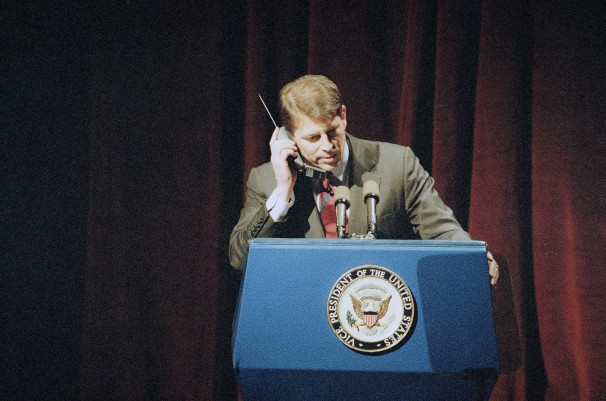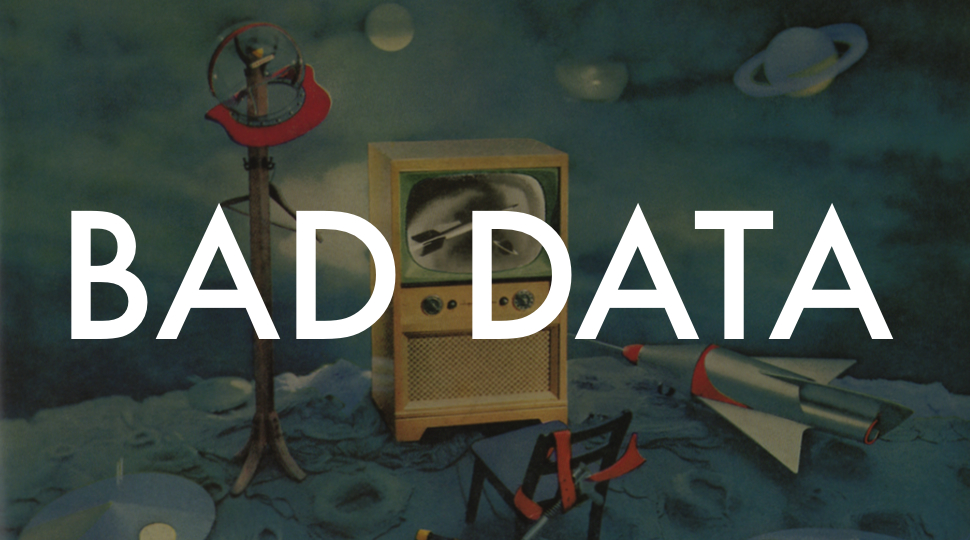The Truth About Al Gore Inventing The Internet
As you know, often on this podcast, I run across issues or tidbits from the past that don’t quite fit our overall narrative. But sometimes those tidbits are just too interesting for me to ignore. One of those things I keep running across is Al Gore and his role with the early Internet.
I think it’s something that we all sort of “know.” That Al Gore claimed he invented the Internet. I remember this being a small political issue at the time of the 2000 election, but I honestly never cared enough to investigate the details. Last weekend, however, I went down a research rabbit-hole and decided to find out the truth. Not because I’m a huge Al Gore fan, or because I’m looking to score points against him either. I was just genuinely interested, and wanted to find out the historical truth— not just the partisan-tinged conventional wisdom.
So, here is what I found out.
(BTW… this is transcribed from a podcast episode, which you can listen to below…)
Al Gore, Nerd
As I’ve mentioned in a previous podcast, when the Clinton/Gore ticket was first elected in 1992, one of their big platform initiatives was the use of computer and digital technology to create new jobs and new industries that would help the country innovate its way out of the sharp recession it was experiencing at the time. Gore was very much put forth as the front man for this new geek-based economy push. In fact, just a few short days after the election in November 1992, The New York Times ran an article with the title, “Clinton to Promote High Technology, With Gore in Charge.” The article stated that the administration wanted the government to finance research “that will flood the economy with innovative goods and services, lifting the general level of prosperity and strengthening American industry.”
Indeed, the Clinton administration followed through with various bills to this effect. And in fact, Gore himself was often involved in many internet and web firsts. Gore became the first Vice President to give a live interactive news conference on a computer network. The first ever White House website was launched as early as October 21, 1994, two months before Netscape version 1.0 was even launched. As a part of Gore’s high-profile project to streamline government bureaucracy, Federal Government agencies were encouraged to utilize the web and internet to cut down on waste and redundancy. And then there was Gore’s involvement in the infamous Clipper Chip initiative, which I discussed in that previous episode.
But it turns out, Al Gore has always been touted as a bit of a nerd. From his first days in Congress in the 1970s, Gore tended to gravitate toward scientific and technological issues, sponsoring and co-sponsoring tech and science bills, as well as seeking assignments on Congressional and Senate committees that oversaw such issues. Describing a young Congressman Gore, a Wired article said, “Before computers were comprehensible […] Gore struggled to explain artificial intelligence and fiber-optic networks to sleepy colleagues.” And the book Computer: A History of the Information Machine said that the “problem of giving ordinary Americans network access had excited Senator Al Gore since the late 1970s.”
In fact, Gore was often lumped in with a group of young lawmakers who were referred to at the time as “Atari Democrats.” The San Jose Mercury News defined Atari Democrats as, “smart young congressmen who sought to make the restoration of American business their issue.” An article in the New York Times referred to Atari Democrats as, “young moderates who saw investment and high technology as the contemporary answer to the New Deal.”
An important thing to remember is that Gore was the son of a famous Senator, Albert Gore Senior, who was one of the principal congressional architects of the Interstate Highway System, which was begun during the Eisenhower administration in the 1950s. So, when Al Gore Jr. began investigating the possibilities of nationwide computer networking systems (for example, introducing S 2594, the Supercomputer Network Study Act of 1986) it’s probably natural that he saw echoes of his father’s achievements linking the country together via roads. It’s unlikely that Al Gore coined the phrase “information superhighway” himself, but he certainly popularized the phrase in speeches and bills he introduced in the 1970s and 1980s. His vision was that citizens around the country could be linked together via computer highways just as his father had linked them together with automobile highways.
And this brings us to the key event that ties Al Gore to Internet History, for better or worse. In 1988, a group led by UCLA professor of computer science, Leonard Kleinrock submitted a paper to Congress entitled Toward a National Research Network. Kleinrock was one of the original creators of ARPANET, as well as the author of the very first scholarly paper on packet switching theory. The paper Kleinrock’s group presented to congress in 1988 envisioned taking the existing Internet to another level by creating a national, collaborative research network. Sort of what Tim Berners Lee would eventually realize with the World Wide Web. Inspired by this paper, Gore would introduce the High Performance Computing and Communication Act of 1991. The bill was intended to funnel federal dollars toward continued research in high performance computing and networking. The legislation was commonly referred to as the “Gore Bill” and when the first President Bush signed it into law on December 9, 1991, he stated that the act would help, “unlock the secrets of DNA,” among other technological innovations.
Among those other innovations, the “Gore Bill,” helped fund important predecessors to the web, such as the National Information Infrastructure and the National Research and Education Network. For our purposes, especially key among those other innovations was funding for the National Center for Supercomputing Applications at the University of Illinois. As you’ll remember from the very first episode of this podcast, the NCSA was where the Mosaic web browser was created. So, every single one of the engineers responsible for creating the Mosaic web browser were receiving salaries thanks to the “Gore Bill.” In fact, none other than Marc Andreessen gave credit to Gore’s bill as a kickstarter for web development in an Industry Standard interview from 2000, saying, “If it had been left to private industry, it wouldn’t have happened, at least, not until years later.”
So Gore Has a Case?
Al Gore did not invent the internet, but we can clearly see that he has a case a) for being a visionary interested in the technology that would eventually bring the internet into the modern era and b) shepherding technology-friendly legislation through congress that led directly to key innovations such as the world wide web. In fact, none other than Robert Kahn and Vint Cerf, two people who actually did help invent the internet, later gave direct credit to Gore’s legislation as being a major milestone in Internet evolution and development, saying:
…there is no question in our minds that while serving as Senator, Gore’s initiatives had a significant and beneficial effect on the still-evolving Internet. The fact of the matter is that Gore was talking about and promoting the Internet long before most people were listening.
(…)
As far back as the 1970s Congressman Gore promoted the idea of high speed telecommunications as an engine for both economic growth and the improvement of our educational system. He was the first elected official to grasp the potential of computer communications to have a broader impact than just improving the conduct of science and scholarship. Though easily forgotten, now, at the time this was an unproven and controversial concept.
(…)
Gore secured the passage of the High Performance Computing and Communications Act in 1991. This “Gore Act” supported the National Research and Education Network (NREN) initiative that became one of the major vehicles for the spread of the Internet beyond the field of computer science.
So, Gore was clearly involved in Internet development, or at least, he marshalled legislation that aided the Internet’s development. But he clearly didn’t invent the Internet.
Why, then, did he say that he did?
Well, that’s where things get a bit complicated. For one thing…
Al Gore Never Actually Said He “Invented” the Internet
The interview that generated the quote in question… the quote that would go on to spawn a thousand light night television jokes… comes from this March 8, 1999 CNN interview with Wolf Blitzer:
The key words from Gore:
… During my service in the United States Congress, I took the initiative in creating the Internet. I took the initiative in moving forward a whole range of initiatives that have proven to be important to our country’s economic growth and environmental protection, improvements in our educational system.
Emphasis mine. A full transcript of the interview can be found here.
So, yeah. We can get into the whole idea of politicians and their mealy-mouthed doublespeak, but Gore doesn’t actually say the famous “I invented…” The problem is, he seems to claim credit for fostering the Internet’s development. By saying “I took the initiative in creating the Internet,” it certainly sounds like he was the wellspring that made it all happen. I suppose, depending upon your political bent, you could interpret what he says in one of two ways:
- I introduced legislation that created the internet.
- I introduced legislation that helped foster the evolution of the internet.
But what is indisputable is that he doesn’t actually claim to be the genius that invented the Internet or even Internet technology.
 So How Did Gore Get Tagged With This Famous Line?
So How Did Gore Get Tagged With This Famous Line?
Well, that’s interesting. Just last year, the Washington Post wrote an article entitled A cautionary tale for politicians: Al Gore and the ‘invention’ of the Internet.
They agreed that the meat of the quote, even allowing for the fact that, “people sometimes misspeak on live television,” seemed to grab credit in a somewhat overly zealous way.
Quoting the Post:
A gaffe sticks if it somehow validates preconceived notions about a politician. Gore had a real story to tell about being one of the first politicians to grasp the importance of interconnected computers. But with one awkward phrase, spun up by opponents and misreported by the media, he managed to obscure his accomplishments and instead become a recurring punch line.
And that’s the thing. The whole quote was spun to fit into a common media charactarization of Gore as a smarty-pants know-it-all, as the snooty professor or moral scold (which of course, the Inconvenient Truth movie did little to alleviate).
The whole brouhaha really kicked off on March 11, 1999, when Wired News published this article by the writer Declan McCullagh, under the title “No Credit Where It’s Due.” McCullagh said that Gore, “took credit for the Internet,” and went on to point out that Gore was too young to have been around for the creation of ARPANET and claimed, “Gore has taken credit for popularizing the term “information superhighway” (…) But the term “data highway” has been used as far back as 1975, before Gore entered Congress.” Of course, Gore didn’t claim anything about ARPANET or the infohighway, at least not in the interview in question.
Nonetheless, within days, the tag of the bragging (and possibly fibbing) Gore stuck. This was in the days before blogs and long before the Twitter echo chamber which today pounces on every little political gaffe or meme, often reliably parsing facts but also bouncing the debate back and forth, ad nauseum. I think the fact that the issue was initially picked up by Wired News was an important factor in the evolution of the meme. Again, this was a more technologically naïve time, and lots of “normal” people would have taken Wired as an expert voice on Internet matters.
On the same day the McCullagh article appeared, House Majority Leader Dick Armey issued a press release that was sarcastically titled “Armey Applauds Vice President Gore for Ingenuity, Creativity and Imagination,” that said, in part:
If the Vice President created the Internet then I created the Interstate highway system. Both were begun during the Eisenhower Administration and I think Ike actually deserves a little credit here.
It’s common in Washington to steal an idea and claim it was yours all along. This strategy certainly worked for the Administration on welfare reform and tax cuts. But claiming credit for the Internet insults its real creators whose hard work and ingenuity can never be stolen.
This was followed by a statement from Senate Majority Leader Trent Lott:
During my service in the United States Congress, I took the initiative in creating the paper clip.
Lott refused to answer questions about whether or not he was also the Fifth Beatle.
And by that point, the meme was truly off and running. The idea that Al Gore claimed credit for inventing the Internet almost immediately became what it’s been ever since: a punch line for late-night comedians. It shares this distinction with the questionable claim that Gore and his then-wife Tipper were the inspiration for the novel and movie Love Story. (As it’s a bit beyond our purview here, I did not investigate the veracity of the Love Story claim as well.)
The now-common joke even made it into the Presidential debates of the 2000 election. During a back-and-forth about the calculation of HMO coverage in the first presidential debate that year, candidate George W. Bush zinged Gore with the line, “Not only did he [Gore] invent the Internet, but he invented the calculator.”
Gore himself would often return to the gaffe, many times trying to defuse it with humor, “I was pretty tired when I made that comment because I had been up very late the night before inventing the camcorder.”
Declan McCullagh followed up with two more pieces in Wired News covering the fallout from the media meme he himself had helped create. It all seemed to fit so well into the, by this point, firmly-established narrative of Gore as the arrogant braggart. Quoting from McCullagh’s third piece:
Reinventing yourself — and rewriting your résumé — is a form of high art in Washington. Then why the opprobrium heaped on Gore? Simple: He was clumsy enough to get caught.
The problem is, McCullagh himself didn’t investigate deeply enough to see that, in fact, Gore was responsible for some significant legislation that, in the opinion of quite a few Internet pioneers, was quite useful in medium’s early days.
In short, Gore kind of had a point, even if he stated it in a, shall we say, over-enthusiastic manner. He kind of did have a hand in helping the Internet develop.
In his most recent book, The Innovators, Walter Issacson says, “It’s a mark of our political discourse that one of the significant nonpartisan achievements on behalf of American innovation [the Gore Bill] got turned into a punch line because of something that Gore never quite said.”
No less a partisan than Newt Gingrich (like Gore, a well-known nerd and innovation policy wonk) is willing to let Gore off the hook for the gaffe, saying,
In all fairness, it’s something Gore had worked on a long time. Gore is not the Father of the Internet, but in all fairness, Gore is the person who, in the Congress, most systematically worked to make sure that we got to an Internet, and the truth is — and I worked with him starting in 1978 when I got [to Congress], we were both part of a “futures group”—the fact is, in the Clinton administration, the world we had talked about in the ’80s began to actually happen.
For what it’s worth, Gore was eventually inducted into the Internet Hall of Fame, but in the category of “Global Connectors” and not in the category of “Pioneers” like Vint Cerf or Bob Metcalfe, and not in the category of “Innovators” alongside the likes of Tim Berners-Lee, Marc Andreessen or even Aaron Swartz.
So In Conclusion, No, Al Gore Did Not Invent The Internet. But Technically, He Never Said He Did.
In the end, based on what I can piece together, it’s clear that Gore made a sloppy statement that maybe you don’t have to take too far out of context to get the impression he was claiming credit for bringing the Internet to life.
But here’s the thing, at least in my opinion.
Most legislators, even to this day, have very little understanding of technology. They don’t really understand how the Internet actually works. And I’m not just talking about things like a series of tubes. I’m saying, our politicians don’t have even a base-level understanding of how things like software and hardware and networking and digital technology actually function in the real world.
And so, that is why we have such terrible laws governing things like patents.
And copyright.
And net neutrality.
Because, since the legislators don’t understand any of it on a very basic level… because it’s all weird, geeky mumbo-jumbo to them… they just trust the lobbyists to understand and write the legislation for them.
And so again, I didn’t write this piece to exonerate or attack Al Gore. I don’t care about what he said on a partisan level. My interests are only historical.
But, I will make this one point: it’s clear that Al Gore was an avid and early fan of technological innovation, of technology’s role in our society, and the ways that government can help or hinder that innovation.
And if we’re being honest, don’t you wish we had a few more politicians like Al Gore in Congress today… who at least cared about technology enough to try to understand it?
We need more nerd politicians. Democratic nerds AND Republican nerds. More nerds!















Franklin D. Roosevelt also claimed the same thing regarding social security, monetary policy, and housing as part of the New Deal. He never said he was the person, or group of people that actually wrote the individual legislations. Nevertheless, he is universally credited with “creating” those reforms. If he didn’t push for those legislations to be created, and financed, they would not exist today. Likewise had Al Gore never pushed legislation to finance the internet initiatives, it would not exist today; at least not in the present form.
[…] Sursa imagine: http://www.internethistorypodcast.com. […]
[…] Sursa imagine: http://www.internethistorypodcast.com. […]
[…] credit: Internet History Podcast | Huffington […]